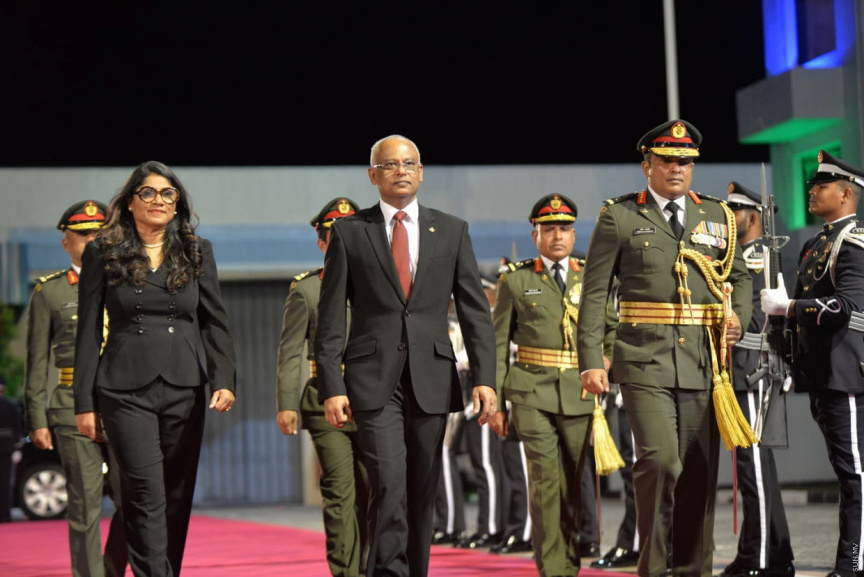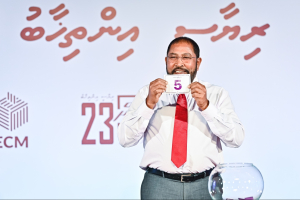The Office of the Information Commissioner of Maldives (ICOM) has told the High Court that disclosure of details of the number of Indian troops in Maldives and the expenditure incurred by the Maldivian government on them could adversely affect bilateral relations and even lead to a shortage of essential foods for Maldives.
The information was sought under the Right to Information Act by Ahmed Azan, co-founder and journalist for “Dhiyares” However, ICOM has decided not to disclose the information as the Defense Ministry has cited exceptional circumstances where it cannot be disclosed, saying it is of national security concern.
As the ICOM decision was appealed in the High Court by Azan, and the AG’s office has intervened on behalf of the Defense Ministry.
Yesterday’s hearing in the case was for ICOM and the state to respond to the appeal points and respond to the allegations. Azan, who is pursuing the case without a lawyer, today responded to ICOM’s written reply to the appeal points.
ICOM told the High Court today that the information sought was part of a contract that stipulated confidentiality, according to the Army Advisory Council. They have requested not to disclose the information as it is related to national security.
ICOM has decided not to disclose the information on the grounds that it could endanger national security and fails to explain how the information relates to national security and how national security would be endangered if disclosed, Azan said in a point of appeal before the High Court.
ICOM’s written response to the appeal points said that if the information is disclosed, it will be in violation of an agreement between the two countries and that there is a possibility of damage to the sovereignty of the Maldives.
Meanwhile, ICOM also noted that Section 29 of the Right to Information Act provides that the public authority has the discretion to refuse to release such information if there is a risk of irreparable harm from releasing information within the scope of the constitutionally defined threat to national security.
Maldives is a small, dependent country for basic needs and if a neighboring country like India disrupts its relationship with Maldives, it is likely to stop receiving aid under the Defense Cooperation with India, ICOM said.
There could also be difficulties in getting essential food items and humanitarian aid from such countries could be halted, the ICOM replied.
However, Azan told the High Court today that it was not based on any grounds. Azan said ICOM has not explained why Maldives will not get the cards after disclosing the number of Indian troops.
In its written reply, ICOM added that national security is not only threatened by sword fighting but that anything that disrupts relations between two countries can threaten national security.
In addition, if the number of Indian troops in Maldives is revealed, other countries may demand the same number of troops in Maldives, the ICOM said.
When someone is planning an attack on a place, which means gathering information about its safety and security, disclosing such information from security forces “would certainly be like plunging one’s own country into ruin with one’s own hands,” ICOM said.
The bench hearing the case in the High Court comprises Chief Justice Hussain Shaheed, Justice Hassan Shafiu and Justice Huzeifa Mohammed.
Asked by Justice Shafiu today whether ICOM had decided not to disclose the information after considering the agreement with India, the ICOM counsel said the decision was based on what the army said during the closed door meeting with the army.
When asked whether it was indeed possible for ICOM to verify that the agreement stated otherwise, the lawyer said that ICOM had that power but the agreement had not been examined in this case. When asked whether the agreement had been submitted to ICOM by Justice Huzaifa, the ICOM lawyer said that they had not even requested for it.
“Based on the discussions in the closed door meeting, we did not have the need to examine the contract at the time,” ICOM’s lawyer said.
In response, Azan said that while the law also gives the Information Commissioner the power to go to the agencies and check whether it can be disclosed, the case has been decided without any of such measures and only on the statement of the army.
In addition, Justice Huzaifa asked whether a secret meeting could be held without the person seeking information. Both ICOM and the AG’s office said the law empowers them to hold secret meetings. However, if the person seeking information is involved, the purpose of keeping the meeting confidential is lost, they said.
Azan said today that the Right to Information Act requires the public to disclose the information if it is in the public interest, even if any agency decides not to disclose the information citing exceptional circumstances. Therefore, the bench asked them to prepare to speak about it at the next hearing.
The court also asked them to come prepared to talk about the mandate of the Army Advisory Council. The bench also asked the court to clarify at the next hearing how the number of foreign troops stationed in Maldives and the expenditure incurred on them is being disclosed.
In 2020 when Azaan first submitted the case to ICO, the then Commissioner Hussain Fiyaz Moosa declared that the decision of the Ministry to withhold the information was justified.
The appeal case proceedings began in the High Court in March of 2022, and Azaan requested the case to be live broadcasted, upon which the bench of Judges approved the request, with no objections from the Information Commissioner’s Office as well.
Currently the role of Indian army officers stationed in Maldives, are to operate the helicopters gifted by the country to the Maldives. The first helicopter was gifted in 2010 and in 2011 when the current speaker of parliament, Mohamed Nasheed was president.
Since the first one was brought to the Maldives, MNDF has been saying that they were training Maldivian pilots to fly the choppers which until now has not happened.
MNDF has denied to give out any information regarding the number of Indian personnel in Maldives nor the amount being spent by the Maldivian tax payers money on these personnel stating that it would be a risk national security.





